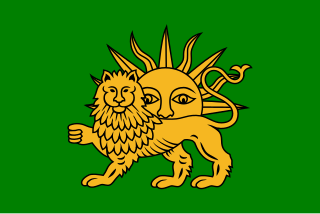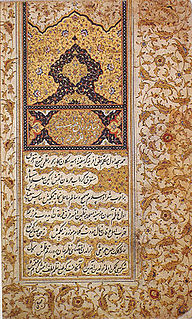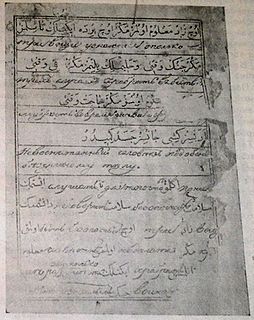
Rubáiyát of Omar Khayyám is the title that Edward FitzGerald gave to his 1859 translation from Persian to English of a selection of quatrains attributed to Omar Khayyam (1048–1131), dubbed "the Astronomer-Poet of Persia".

The Safavid dynasty was one of the most significant ruling dynasties of Iran from 1501 to 1736. The Safavid dynasty had its origin in the Safavid order of Sufism, which was established in the city of Ardabil in the Iranian Azerbaijan region. It was an Iranian dynasty of Kurdish origin, but during their rule they intermarried with Turkoman, Georgian, Circassian, and Pontic Greek dignitaries. From their base in Ardabil, the Safavids established control over parts of Greater Iran and reasserted the Iranian identity of the region, thus becoming the first native dynasty since the Sasanian Empire to establish a national state officially known as Iran.

The Shahnameh is a long epic poem written by the Persian poet Ferdowsi between c. 977 and 1010 CE and is the national epic of Greater Iran. Consisting of some 50,000 "distichs" or couplets, the Shahnameh is one of the world's longest epic poems. It tells mainly the mythical and to some extent the historical past of the Persian Empire from the creation of the world until the Muslim conquest in the seventh century. Iran, Azerbaijan, Afghanistan and the greater region influenced by Persian culture such as Georgia, Armenia, Turkey and Dagestan celebrate this national epic.

Bahadur Shah Zafar or Bahadur Shah II was the last Mughal emperor. He was the second son of and became the successor to his father, Akbar II, upon his death on 28 September 1837. He was a nominal Emperor, as the Mughal Empire existed in name only and his authority was limited only to the walled city of Old Delhi (Shahjahanbad). Following his involvement in the Indian Rebellion of 1857, the British exiled him to Rangoon in British-controlled Burma, after convicting him on several charges.

Persian literature comprises oral compositions and written texts in the Persian language and is one of the world's oldest literatures. It spans over two-and-a-half millennia. Its sources have been within Greater Iran including present-day Iran, Iraq, Afghanistan, the Caucasus, and Turkey, regions of Central Asia and South Asia where the Persian language has historically been either the native or official language. For example, Rumi, one of the best-loved Persian poets, born in Balkh or Wakhsh, wrote in Persian and lived in Konya, at that time the capital of the Seljuks in Anatolia. The Ghaznavids conquered large territories in Central and South Asia and adopted Persian as their court language. There is thus Persian literature from Iran, Mesopotamia, Azerbaijan, the wider Caucasus, Turkey, Pakistan, Bangladesh, India, Tajikistan and other parts of Central Asia. Not all Persian literature is written in Persian, as some consider works written by ethnic Persians or Iranians in other languages, such as Greek and Arabic, to be included. At the same time, not all literature written in Persian is written by ethnic Persians or Iranians, as Turkic, Caucasian, and Indic poets and writers have also used the Persian language in the environment of Persianate cultures.

Ahmad Shamlou was an Iranian poet, writer, and journalist. Shamlou was arguably the most influential poet of modern Iran. His initial poetry was influenced by and in the tradition of Nima Youshij. In fact, Abdolali Dastgheib, Iranian literary critic, argues that Shamlou is one of the pioneers of modern Persian poetry and has had the greatest influence, after Nima, on Iranian poets of his era. Shamlou's poetry is complex, yet his imagery, which contributes significantly to the intensity of his poems, is accessible. As the base, he uses the traditional imagery familiar to his Iranian audience through the works of Persian masters like Hafez and Omar Khayyám. For infrastructure and impact, he uses a kind of everyday imagery in which personified oxymoronic elements are spiked with an unreal combination of the abstract and the concrete thus far unprecedented in Persian poetry, which distressed some of the admirers of more traditional poetry.

Turkish literature comprises oral compositions and written texts in Turkic languages. The Ottoman and Azeri forms of Turkish, which forms the basis of much of the written corpus, were highly influenced by Persian and Arabic literature, and used the Ottoman Turkish alphabet.

Azerbaijani literature is written in Azerbaijani, a Turkic language, which is the official state language of the Republic of Azerbaijan, where the North Azerbaijaini variety is spoken, and is the first-language of most people in Iranian Azerbaijan, where South Azerbaijani is spoken. While the majority of Azerbaijani people live in Iran, modern Azerbaijani literature is overwhelmingly produced in the Republic of Azerbaijan, where the language has official status. Three scripts are used for writing the language : Azerbaijani Latin script in the Republic of Azerbaijan, Arabic script in Iranian Azerbaijan and Cyrillic script in Russia.

Mehdi Akhavān-Sāles, or Akhavān-Sāless, pen name M. Omid was a prominent Iranian poet. He is one of the pioneers of Free Verse in the Persian language.

The Qutb Shahi dynasty ruled the Golconda Sultanate in south India from 1518 AD to 1687 AD. The Qutb Shahis were descendants of Qara Yusuf from Qara Qoyunlu, a Turkoman Muslim tribe. After the collapse of Bahmani Sultanate, the "Qutb Shahi" dynasty was established in 1518 AD by Quli Qutb Mulk who assumed the title of "Sultan". In 1636, Shah Jahan forced the Qutb Shahis to recognize Mughal suzerainty. The dynasty came to an end in 1687 during the reign of its seventh Sultan Abul Hasan Qutb Shah, when Mughal Emperor Aurangzeb seized Golconda fort and occupied the kingdom. The kingdom extended from the parts of modern day states of Karnataka, Andhra Pradesh and Telangana. The Golconda sultanate was constantly in conflict with the Adil Shahis and Nizam Shahis.

Hakim Abul-Majd Majdūd ibn Ādam Sanā'ī Ghaznavi, more commonly known as Sanai, was a Persian poet from Ghazni who lived his life in the Ghaznavid Empire at the time of its golden age, in medieval Khorasan, which is now located in Afghanistan. He was born in 1080 and died between 1131 and 1141.

Prince Iraj Mirza, son of prince Gholam-Hossein Mirza, was a famous Iranian poet. He was a modern poet and his works are associated with the criticism of traditions. He also made translation of literary works from French into Persian.
Jocoseria is a collection of short poems by Robert Browning, first published in 1883. Effectively a continuation of the Dramatic Idyls series, the book was not well received by critics at the time and has continued to be considered one of the poet's least effective collections, aside from the famous prologue to the collection.
Islamic poetry is a form of spoken word written & recited by Muslims. Islamic poetry, and notably Sufi poetry, has been written in many languages including Urdu and Turkish.
The publishing industry in Pakistan is hampered both by a low literacy rate (48%).

Reza Baraheni, is an Iranian, an exiled Iranian novelist, poet, critic, and political activist.

Sindhi literature, Sindhi-language literature in the Pakistani province of Sindh, consists of poetry and prose. It was influenced by a number of cultures over a thousand years.
Nationality words link to articles with information on the nation's poetry or literature.
Punjabi literature, specifically literary works written in the Punjabi language, is characteristic of the historical Punjab of India and Pakistan and the Punjabi diaspora. The Punjabi language is written in several scripts, of which the Shahmukhi and Gurmukhī scripts are the most commonly used in Pakistan and India, respectively.
Arjan Tanwani, popularly known by his pen name Arjan Hasid, was an Indian Sindhi language poet who had authored seven collections of poems and ghazals. He won the Sahitya Akademi Award in Sindhi in 1985 for his collection of ghazals Mero Siji (1984) and was conferred with the Sahitya Akademi fellowship in 2013, the highest honour of the Sahitya Akademi.













